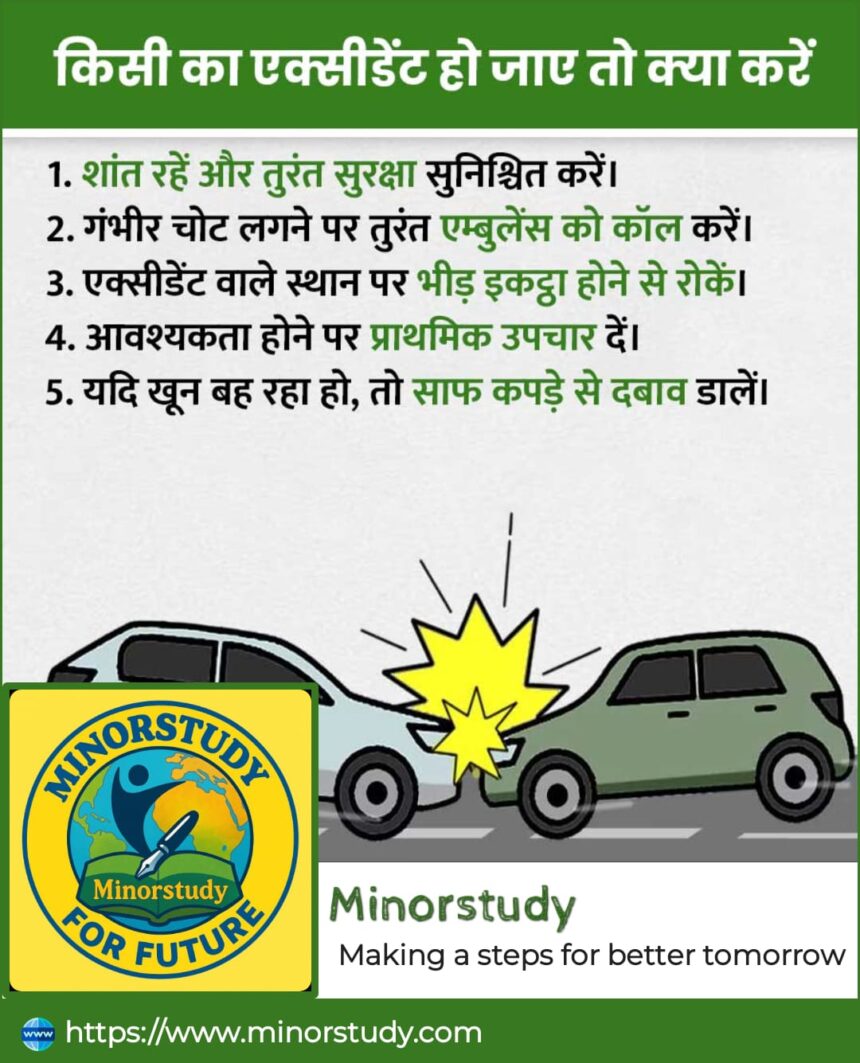11 Life-Saving Steps You Must Take If Someone Has an Accident – A Positive Action Guide
🚨 Introduction: Accidents Don’t Knock—Be Ready to Act
Accidents can happen anytime, anywhere—at home, on the road, at work, or in public places. In such unexpected moments, the difference between life and death, recovery or disability, often depends not just on medical care, but on how quickly and calmly the people around respond.
- 🚨 Introduction: Accidents Don’t Knock—Be Ready to Act
- 🧭 Timeline: Evolution of Emergency Response
- 📜 History and Background: How Accident Response Has Evolved
- ✅ 11 Life-Saving Steps to Take When Someone Has an Accident
- 1. Ensure Your Own Safety First
- 2. Call for Emergency Help Immediately
- 3. Don’t Move the Victim Unnecessarily
- 4. Check for Consciousness and Breathing
- 5. Stop Any Bleeding
- 6. Provide Reassurance
- 7. Don’t Offer Food or Water
- 8. Note Visible Symptoms
- 9. Assist Paramedics on Arrival
- 10. Protect Their Belongings
- 11. Stay Back and Cooperate
- 🧠 Important Facts About Accidents
- 📌 Significance in Our Daily Life
- 🎓 Observance and Laws: Good Samaritan Act in India
- 🙏 Wishing Message for Victims and Helpers
- 🤔 FAQs: What to Know About Helping Accident Victims
- 🔹 Q1: Can I be arrested for helping an accident victim?
- 🔹 Q2: Should I perform CPR if I’m not trained?
- 🔹 Q3: What if I accidentally worsen the injury?
- 🔹 Q4: What should I do if it’s a child or elderly person?
- 🔹 Q5: Can I leave after the ambulance arrives?
- 💬 Important Points to Remember
- 🌍 Importance to Society
- 🧩 Conclusion: Be the Difference
- ✅ Key Takeaways
This article is a complete guide to help any ordinary person know what to do if someone has an accident, why it matters historically, and how society has shaped its response systems over time.
🧭 Timeline: Evolution of Emergency Response
| Year | Milestone |
|---|---|
| 1865 | First modern ambulance service began in Cincinnati, USA |
| 1958 | CPR (Cardiopulmonary Resuscitation) techniques introduced |
| 1960s | Introduction of national emergency numbers (like 911 in USA, 112 in EU) |
| 2005 | WHO declared Road Safety a global health issue |
| 2022 | India’s Good Samaritan Law reinforced to protect accident helpers |
📜 History and Background: How Accident Response Has Evolved
Historically, accident victims were often left unattended due to fear of legal implications or lack of training. In the early 1900s, first aid awareness started growing through institutions like the Red Cross. The development of emergency services, trauma care, and Good Samaritan protections has improved outcomes dramatically.
In India, road accidents alone claim over 1.5 lakh lives annually, many of which could be avoided through timely bystander assistance.
✅ 11 Life-Saving Steps to Take When Someone Has an Accident
1. Ensure Your Own Safety First
Never rush blindly. Check your surroundings—is it safe to approach the person? If it’s a traffic accident or fire, secure the scene before intervening.
2. Call for Emergency Help Immediately
In India, dial 112 (Emergency Services) or 108 (Ambulance in many states). Provide:
Exact location
Nature of accident
Number of victims
Visible injuries
3. Don’t Move the Victim Unnecessarily
Unless there’s imminent danger (fire, collapse), avoid moving them—especially if there’s potential spinal injury. Untrained movement may cause permanent damage.
4. Check for Consciousness and Breathing
Ask loudly, “Are you okay?”
If unresponsive, check:
Airway
Breathing
Circulation (Pulse)
If trained, begin CPR for cardiac arrest cases.
5. Stop Any Bleeding
Apply firm pressure using a clean cloth or hand. If bleeding is from limbs, elevate if possible and apply a tourniquet (only if trained).
6. Provide Reassurance
If conscious, talk to the victim. Tell them help is on the way. This reduces panic and shock.
7. Don’t Offer Food or Water
Injuries may require surgery. Giving food or water can complicate medical treatment, especially if unconscious.
8. Note Visible Symptoms
Bleeding, vomiting, seizures, confusion, or any limb deformity—observe and report these to emergency responders.
9. Assist Paramedics on Arrival
Share what you observed and did. This can speed up diagnosis and ensure continuity of care.
10. Protect Their Belongings
Secure wallets, phones, or ID cards. These may help identify the victim and contact family.
11. Stay Back and Cooperate
If you’re not medically trained, let professionals take over once they arrive. However, cooperate fully with law enforcement and don’t flee.
🧠 Important Facts About Accidents
India ranks #1 globally in road accident deaths.
85% of trauma deaths happen within the “Golden Hour.”
Most people avoid helping due to legal fears—despite laws protecting them.
Basic first aid could reduce fatalities by over 35%.
📌 Significance in Our Daily Life
Understanding how to act during an accident is not just an act of bravery—it’s a social duty and a moral compass. A few quick, educated actions can:
Save a life
Prevent lifelong disability
Reduce hospital costs
Build social trust
Your presence of mind can be more powerful than a doctor’s expertise—if you act quickly.
🎓 Observance and Laws: Good Samaritan Act in India
Recognizing the hesitation people have due to legal harassment, India passed the Good Samaritan Law in 2016 (upheld by Supreme Court).
Key Provisions:
You are not liable for any civil or criminal case if you help.
You are not forced to reveal identity unless you wish.
You can leave after helping, no need to wait for police.
Yet, less than 10% of Indians are aware of this law. It’s crucial to spread awareness and normalize helping.
🙏 Wishing Message for Victims and Helpers
To Victims:
“You are not alone. May your strength bring you healing, and may you find helping hands when you need them the most.”
To Bystanders/Helpers:
“You are a hero in someone’s story. Your courage and compassion make the world a safer place.”
🤔 FAQs: What to Know About Helping Accident Victims
🔹 Q1: Can I be arrested for helping an accident victim?
No. Under the Good Samaritan Law, you are protected from legal or police trouble.
🔹 Q2: Should I perform CPR if I’m not trained?
Only perform CPR if you’ve received basic training. If not, follow dispatcher instructions over the emergency call.
🔹 Q3: What if I accidentally worsen the injury?
The law understands you acted in good faith. You are not responsible for unintended outcomes.
🔹 Q4: What should I do if it’s a child or elderly person?
Follow the same steps but be extra gentle. Prioritize calming them and protecting them from further injury.
🔹 Q5: Can I leave after the ambulance arrives?
Yes. You can leave after helping, unless you choose to stay or are required as a witness.
💬 Important Points to Remember
Golden Hour = Golden Chance
Never assume “someone else will help”
Always call emergency services first
Know basic first aid and CPR
Be a Good Samaritan, not a silent spectator
🌍 Importance to Society
A compassionate society is not defined by its laws alone, but by how its people act when no one’s watching. Accidents are not just medical events; they’re moments of moral testing. In helping others, we become more human.
Building a culture where helping is instinctive can save thousands of lives. It reduces healthcare burdens, builds community trust, and fosters a civilized, connected society.
🧩 Conclusion: Be the Difference
Accidents are unpredictable, but our response doesn’t have to be. In those critical first moments, it’s ordinary people like you and me who become the deciding factor between hope and tragedy.
Suited in kindness, armed with awareness, and protected by law, you can be the reason someone survives. The world needs more people who act, not just observe.
✅ Key Takeaways
Call emergency numbers immediately (India: 112 or 108)
Never move the injured unless absolutely necessary
Apply basic first aid if trained
Good Samaritan Law protects you legally
Helping accident victims saves lives and builds humanity








